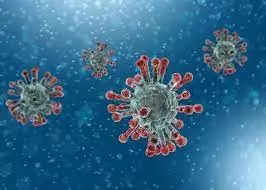
New Delhi: Changes in the spike protein enhanced the ability of the coronavirus to infect the brain, which could underlie the brain-related symptoms of the disease, including brain fog of long Covid, according to a new study. The spike protein directs the virus, SARS-CoV-2, how to enter human cells before infecting them with COVID-19.
The exact causes of long Covid, which persists for months after the initial infection, and its brain-affecting symptoms are still not known and are being widely studied around the world.
The study could, therefore, help scientists understand these aspects better and may lead to specific treatments to protect and clear the virus from the brain, according to researchers at Northwestern University, UK, and the University of Illinois-Chicago, US.
For the study, published in the journal Nature Microbiology, the researchers infected mice with the coronavirus. As the virus multiplied itself within the host, the researchers compared the spike proteins of the viruses in the brain with those in the lungs.
Mice are often studied as they are biologically similar to humans.
The researchers found that in the lungs, the spike protein looked very similar to that of the virus used to infect the mice. However, in the brain, the spike proteins of most of the viruses were found to have a deletion or mutation in the region critical for entering human cells.
“Looking at the genomes of viruses found in the brain compared to the lungs, we found that viruses with a specific deletion in spike were much better at infecting the brains of these animals,” said Judd Hultquist, an assistant professor of medicine (infectious diseases) at Northwestern University and a corresponding author on the study.
Further, when the viruses having the mutated spike protein travelled to the lungs of the mice, they were found to be weakened.
The researchers, therefore, suggested that these viruses were better able to infect the cells of the brain and the central nervous system.
The authors also believe that the spike protein is a “critical regulator of whether or not the virus gets into the brain”.
The findings could thus have large implications for the treatment and management of neurological symptoms reported by COVID-19 patients, Hultquist said.
“If (long Covid) is caused by infection of cells in the central nervous system, our study suggests there may be specific treatments that could work better than others in clearing the virus from this compartment,” he said.







